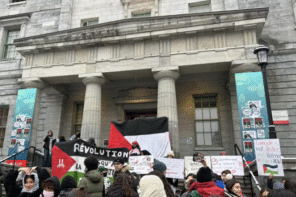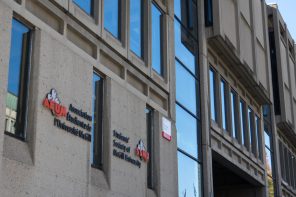The other day, I was invited to a Facebook event called “SSMU for All students: Vote No on March 15.” Upon reading the event description which laid out why these students would be voting No on the upcoming SSMU GA motion regarding McGill’s divestment from companies profiting from the illegal occupation of the Palestinian Territories, I was confused. Having just read the official wording of the motion as well as the event description for the “Yes” campaign, it seemed to me that the “No” group was addressing a set of totally different issues.
This, I fear, is exactly what the “No” campaign intended to do.
Unfortunately, I feel that I need to preface this letter by saying that I am neither anti-Israel nor anti-Semitic (as I no doubt will be accused of being), nor am I addressing this issue from a pro-Palestine standpoint. I am addressing it from a pro-Human Rights standpoint. I support this motion for the exact same reason I support the Free West Papua campaign and oppose the actions of Boko Haram: because I believe in the freedom of individuals and inalienable human rights.
The first point that jumped out at me while reading the “No” campaign was that they had clearly attempted to turn this motion into a discussion of the Boycott, Divestment and Sanctions (BDS) movement. This is disingenuous, as the “Yes” campaign explicitly says, “It is not even a motion to divest from Israeli corporations, or to bring BDS to McGill.” Rather, the motion is solely about withdrawing investments that directly fund contraventions of international law. In fact, the discussion of BDS is irrelevant in this context as none of the companies singled out by this motion (RE/MAX, Oshkosh, Volvo, Mitsubishi and Toyota) are Israeli.
The “No” campaign again attempts to delegitimize its opposition, claiming that, if successful, “the SPHR will become the sole authoritative body on this issue.” In essence, they are implying that the SPHR alone condemns Israel’s forced demolition of Palestinian homes and its illegal settlement of the West Bank. But, these are not subjective claims fabricated by the SPHR to support their “narrative;” these claims are supported by the UN Human Rights Council’s report, which stated that Israel’s actions in the Occupied Territories contravene the Geneva Convention and should be stopped immediately.
It seems to me hypocritical that these students – for the most part the exact same people who successfully motioned to permanently avoid debate on the topic of Israel’s actions in the Occupied Territories during the last GA – are now claiming to be the protectors of free speech. The “No” supporters claim that it is wrong for SSMU to take a stance on contentious issues such as this by asserting that it divides and marginalises students. However, I have to reject this statement on a number of grounds.
Firstly, as SSMU VP University Affairs Claire Stewart-Knight stated on this same topic during the previous SSMU GA, “SSMU’s Constitution requires [SSMU] to take stances on human rights and social justice issues. The “No” proponents will continue to say that they are protecting McGill students from having SSMU take a political stance for them. In truth, this is nonsensical as SSMU takes political stances on behalf of students all the time, and these “defenders of free thought” are nowhere to be found when these motions are brought up.
For example, during the GA in which the “No” campaign successfully prevented any debate of Israel’s actions in the Occupied Territories, SSMU voted to condemn fiscal austerity. Such a vote entails that, on behalf of the student population, SSMU chose to oppose fiscal austerity, an economic theory prominent in most developed nations and endorsed by the IMF. Where were the students who had just voted against SSMU taking a stance on political issues? Well, they left the GA as soon as their vested interests had been protected and the Israel issue shelved.
This debate also serves to bring up a wider question about the nature of democracy as a whole. The “No” supporters vehemently criticize their opponents, stating that the passing of this motion would “delegitimize all other voices on campus” and lead to “a forced monopolization of the complex discussions of issues in Israel-Palestine.” Unfortunately, this is how democracy works. If one side wins an election or passes a motion that is not totalitarianism, it is democracy in action.
Further, the “No” group makes inflammatory statements, such as “Students will be paying for this group to exercise sole control on the flow of information [regarding this topic] to students.” However, there is of course no basis to the claims that SSMU taking a stance on this issue would “suppress individuality and go against the fundamental notion of the free sharing of ideas in educational institutions.” This motion would in no way prevent students from forming or expressing their own opinions on the wider issue of Israeli-Palestinian relations, it would simply be a democratic representation of the fact that a majority of students felt it is inappropriate for McGill to directly fund the illegal expansion of settlements.
Such assertions are indicative of the rhetoric used by the “No” supporters in their attempts to shut down debate on the matter. For them, it is not about inclusivity: it is about reinforcing the status quo. They hope that they can prevent any criticism of Israel’s foreign policies by claiming this motion is either an attack on Israel and their right to exist, or an attempt to fund anti-Israel programs. Again, this is not true, nor does it have anything to do with the motion these people are apparently opposing; it is simple scaremongering.
I would like to finish by returning to my original appeal: that we debate this motion based on its wording and also that of the SSMU Constitution, rather than trying to segue into a wider debate on Palestine. I respect the right of the “No” supporters to their opinions, and I invite them to express these opinions through motions that explicitly address the issues that form the core of their campaign. Possible examples of such motions include “Motion to Remove the SSMU Constitution’s Clause on Human Rights;” “Motion Not to Recognise the Geneva Convention and the UN Human Rights Council’s Interpretation thereof;” or even “Motion to Prevent SSMU from Voting on Divisive Issues.”
In short, there should be no more hiding behind the banner of inclusivity, and no more attempting to smokescreen the issues in the Occupied Territories by bringing up other debates. Ultimately, I am asking the “No” campaign to either engage with the issue as it has been put before the GA, or simply leave it alone. I implore them: tell us how you really feel.
James Wilson
U2 Finance student
The views expressed in this opinion piece are the author’s own and do not necessarily represent those of The Bull & Bear.







